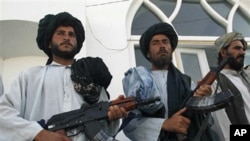A senior leader in Afghanistan says he believes Taliban insurgents are willing to negotiate an end to the country's nine-year war. Former Afghan President Burhanuddin Rabbani addressed his first news conference in Kabul Thursday since becoming head of the "High Council for Peace," designed to discuss efforts to persuade the Taliban and other Afghan insurgent groups to stop fighting.
Rabbani said the Taliban have always set tough conditions to start the peace process but they have never rejected the talks completely, adding that this indicates the Taliban want to talk and negotiate.
The chief of the peace council also said he has held meetings with some of those who are part of the Taliban network who are willing to talk. As he put it, there are people among the Taliban who send messages of their willingness to engage in talks. They are the first steps in the journey toward peace, said Rabbani, but it will take more time before messages of willingness turn into good news.
Afghan President Hamid Karzai in a television interview earlier this week acknowledged his government has been holding informal discussions with the Taliban.
But the insurgent group has denied any such talks "with the enemy as baseless propaganda." It also has reiterated no peace talks can be held until all international troops leave Afghanistan.
Also, Thursday Rabbani requested that NATO-led international forces to do all they can to support negotiations with the Taliban.
Another senior council member, Mahsoom Stanikzai, sitting alongside the council's chief, said NATO's support was vital to the peace process. He said halting military operations in areas where reconciliation talks are taking place and reducing civilian casualties are among the steps international forces can take to facilitate the process.
At a NATO meeting in Brussels Thursday, both U.S. Secretary of State Hillary Clinton and Defense Secretary Robert Gates cautioned that reconciliation contacts between the Afghan government and Taliban leaders are only beginning. Both said negotiation opportunities are worth exploring.
NATO officials are also reported as saying the international alliance will allow Taliban leaders to travel to Kabul for holding talks with the government.
Meanwhile, there is no let up in insurgent attacks in Afghanistan with NATO confirming more deaths in separate incidents on Thursday.
The current year has proven to be the deadliest for foreign troops in Afghanistan since the war began nine years ago. The Taliban insurgency has steadily expanded in the meantime to areas of the country that used to be relatively peaceful.
Afghan Taliban Ready to Negotiate War's End




